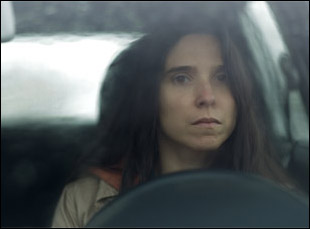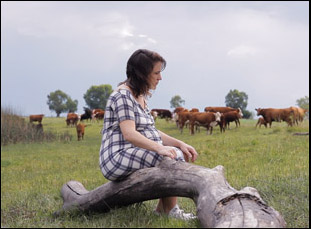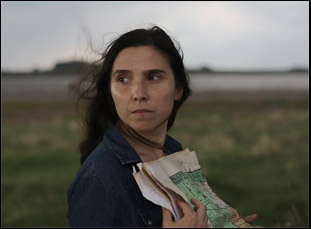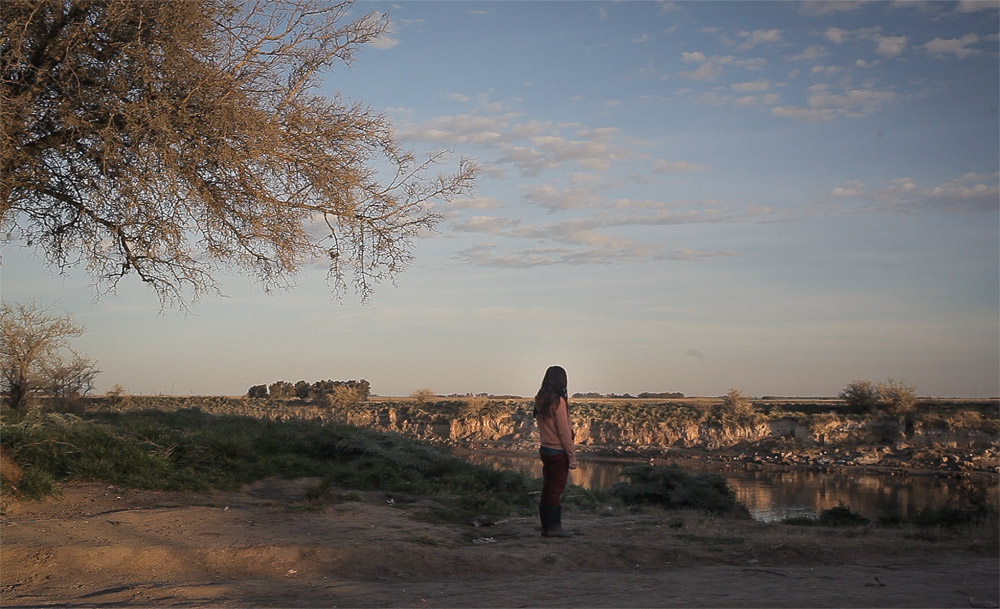In “Trenque Lauquen,” plenty of questions arise upon the abrupt disappearance of Laura (Laura Paredes), a radio host in the small Argentinean burgh of the titles whose curiosity would seem capable of leading her just about anywhere, inspiring a pair of men in her life to try and find her. However, filmmaker Laura Citarella was always less concerned with the mystery at hand than exploring the nature of mysteries in and of themselves.
“When I finished this film and I spoke a lot in the interviews, I found myself saying that this is about something that you cannot put a name and cannot classify, and you cannot say one truth about,” Citarella said recently. “You cannot explain it, so it delivers itself to this idea that life is a mystery. We cannot understand everything, and we knew from the very beginning, we had to keep on working [on this aspect], because even when you finish the film and the days pass, I think that you still think about all these mysteries because you cannot find the response.”
Then again, there are other reasons why “Trenque Lauquen” is bound to linger, a bold and beguiling drama in which Citarella takes up the challenge of taking a medium where the concrete nature of imagery may leave less to the imagination than another like literature, yet opens up the mind to romantic notions of how individual perspective always can limit how much we can ever really know about someone else. To achieve such an elusive narrative, Citarella divides the film into two two-hour parts, watching in the first as Laura digs into the life of a Russian revolutionary for her radio program and comes across a love letter that stokes her interest, as well as Ezequiel (Ezequiel Pierri), a taxi driver who gradually becomes an informal research partner, to learn more about an unknown historical relationship. However, before she can bring this secret to the surface, she goes underground, leaving Ezequiel and her boyfriend Rafael (Rafael Spregelburd) to attempt to piece together her whereabouts from their experience of her, which isn’t exactly the same.
“Trenque Lauquen” grows more surreal in the second half, both as Rafael and Ezequiel wonder whether there’s anything they actually can believe to be true about Laura to help with their search and the community at large grows concerned about another ghost, truly of the supernatural kind that may have appeared at the local lake, but while Citarella is careful not to ever set too much in stone, the slippery narrative becomes gripping as intrigue of what could be overtakes the reality of what is.
Originally conceived as an extension of “Ostende,” the director’s 2011 collaboration with Paredes, where the two would take the bones of the same story of a hotel guest observing the strangers around her and relocate it to see how a change of scenery may affect it, the film is full of the same surprises that awaited Citarella as the story took on a life of its own over the course of several years and emboldened by fellow filmmakers in the collective El Pampero, also responsible for the absorbing 2018 13-hour drama “La Flor,” she lets the narrative take shape organically with all its fascinating detours intact. A standout not only because of its length but its enchanting nature at the Venice and New York Film Festivals last fall, “Trenque Lauquen” arrives as a theatrical event this spring, starting its run this week at Film Society at Lincoln Center where Citarella will appear for Q & As, and recently she answered a few questions for us about following her instincts wherever they may have led in the making of her latest film, the inspiration of music and how her films and real life are prone to blurring.

When we finished “Ostende,” we were also making “La Flor” — Laura was an actress there [too] and we said, “Okay, we want to work together again” and we started having fantasies with this idea of a saga, bringing the same character to a different town. We decided that we were going to do it in Trenque Lauquen because that’s where my family comes from and I made two films in the middle, and then we finished “La Flor” but we joined together again to make the to write “Trenque Lauquen,” always thinking that, as we have “Ostende” when we were 30, “Trenque Lauquen” when we were 40, and now we have to think [about] another film when we are 50. [laughs]
I’m already looking forward to it. With the experience of “La Flor,” did it make you reconsider what might’ve been possible narratively when making something of this length and scope?
Yes, it’s impossible to make films like this if you don’t work the way we work — to have your own time to think and develop ideas, and to go back and forward with ideas, and then maybe try something that doesn’t work, so you go back and you rewrite, and then you edit, and then you shoot. [There’s] this idea of working through the years and testing different things — while you are making a film for us, you are also practicing that film. You don’t already know what the film is going to be. the traditional ways of producing, [where] they write a script and then they go to look for the locations and then they look for the actors and then they shoot, in our case, it’s different. We write the films and we already know the actors because we want to work with them and we want to work in this specific place and then it’s important for us to go and find the way the actors are going to act and the way that you’re going to use the camera in the shooting. Maybe you have some ideas, but then the real thing appears during the process of the film, so it’s a very alive way of working.
Did this evolve from the initial conception much?
No, the direction of the film didn’t change much, but the difference is the structure of the film, because at the beginning, It was like more like a chronological film where you were with the main character all the time. But then lots of things happened over time in real life]. I was pregnant and you grow up and you change your mind regarding some things, and there was something missing in the first version of the film that was certain idea of danger or mystery in the disappearance of this woman. If you tell the story in a chronological way, you will understand what happens to the character, because you will be with the character, but if you go the other way around and start the film through the eyes of two two guys trying to understand why a woman left, it’s more enigmatic and mysterious, so it leaves you the possibility of having your own relationship with the clues and you also can have your own hypothesis [about] what happened with this character that left. So [the changes] had to do more to how you give the audience the information than with what was happening in the film — the [lake] creature, the letters, the books, everything was from the very beginning.
When I saw the film out of Venice, it was wonderful to learn Laura’s ringtone was “Suspicious Minds,” and as I understand it, music is a way for you to tap into your characters. How does it open things up for you?
[“Suspicious Minds”] was my ringtone because I’m very big, big fan of Elvis Presley and that was the ringtone in “Ostende” and it was in a way her song, but I had to change this [after the premiere] because of rights. I was going to spend more money on “Suspicious Minds” than the whole film. But this system of songs works for [me, thinking about the characters]. For example, “Los Caminos,” the song that Ezequiel is listening to all the time – he’s very emotionally paralyzed in the situation and he’s having a lot of emotions and he cannot say them, but suddenly the song speaks for him, so that was the first character that found his own song. But then for “Words Don’t Come Easy,” I recorded myself because I couldn’t [afford] the rights of the original song and I’m also a musician, but that is the song of the women and it’s incredible because the other day, somebody told me something that I didn’t realize. When you lose the voiceover of the first part, it starts being more silent and suddenly “Words Don’t Come Easy” appears, [which] I didn’t realize. But we wanted to use music that came from the script in a way that had a relationship with the characters, and with what is happening at that moment of the film. For example, there is a song by Violeta Parra that says “Adiós, adiós, me voy, me voy” and I didn’t want the music just to be put there because it’s nice and it sounds beautiful, but also to help the characters have their own music and their own words through the songs.It’s also smart of you to record your own music – I remember hearing that Joachim Trier includes a piece of his own music in every film because the residuals are better.
Yeah, I recorded most of the songs and then my friend, Ramiro, the composer of “Los Caminos,” and another friend helped me make that music for all the parts in the radio. It’s completely out of [budget] to use hits by Elton John or Barbra Streisand. One song could cost half of the entire budget of the film, but apart from that, I think that it’s important to invent things that are from that universe. It’s better to invent your own songs as you invent your own plot, your own characters, your own customs, your own objects. It’s beautiful.

I don’t know. At the beginning, everything was in my mind because I really knew this place. My family comes from there and I was designing possible scenes and places where we could shoot, and when we started going to shoot, Laura became part of that town in a way [as she] got to know the people and the rhythm of the place — and not only her, but also with Ezequiel, my husband, who [plays Ezequiel in the film]. He started being more connected with the people in the town, more than I, because this is what happens when you make films. You finally feel that Trenque Lauquen is something of our own and you suddenly can live not only the [story of the] film itself, which I think is a way of living several lives, but also for the people involved in making the film, they feel that they can live a different life for a while when you make a film in six years in a different town.
The radio station serves as this wonderful communal center for the story and you come to use it in a clever way narratively as a way into Laura’s inner thoughts. Was that a foundational element of this?
Yes, because we shot some scenes in 2017 at the radio [station] and [then] I was pregnant, so when we restructured the film, we decided we wanted to expand the the idea of the radio because I wanted to portray the city with all the habits of the people and the places. It’s a very funny place where you have this slow rhythm, and [for instance], this guy [at the station] that delivers the program late to the girls, this is my uncle, and he’s not an actor. He’s from Trenque Lauquen and he really has a radio program. So that’s why I thought that the radio was a very particular way of portraying the people in Trenque Lauquen, but because the first part of the film is other people’s versions of what happened to Laura and the second part is Laura’s version, we had to decide how to bring this version [out]. We thought she could write a diary, she could write a letter, but then we said, no, we have to work with the same elements that we [already] have in the film and one is the radio. There’s a film I really love, “Double Indemnity” where there’s this very intimate confession and we discovered when we were making this part [of our film] that there was something like a theatrical language that appears on the radio because it is such an isolated place because of the sound and nobody is there at night, so we thought it could be good for this kind of confession of hers.
And [because initially] we shot the radio [station] in Trenque Lauquen in 2017, the pandemic came and they demolished it, so we no longer had the radio [station] and we had to rebuild it in a set in our office in Buenos Aires. We made a radio [station] exactly the same as the one that was in Trenque Lauquen in Buenos Aires, so in the film, you will see a mix of scenes shot in [on location] and on a set in Buenos Aires [which] for me is a good example of what happened during six years that we were shooting a film. Suddenly after the pandemic, all these places started disappearing, being closed, being demolished — [besides] the radio, the newspaper in Trenque Lauquen almost disappeared after the pandemic. They only work online [now], so that’s why we were very proud of having portrayed for the last time this important radio [station].

Yes, because if I want to show my daughter someday how radio [stations] were in Trenque Lauquen at that moment, well, I have it in my film. [laughs] So in a way, everything is a documentary of everything, and especially this film is a document of its own shooting and of a city that is changing in the province of Buenos Aires. Ezequiel is my husband, and my small baby Lucia appears – she plays Juana, the daughter of Carmen Zuna [who I play in the film], and for example, Ezequiel is performing, of course, but in a way he’s also being Ezequiel because he’s not an actor and the character was written for him, so the film is mixing life and cinema all the time. And [when] we went to a festival in Italy, we said, “Why don’t we do some shooting for the film?” And the crew of this trip was Ezequiel, my daughter Lucia and I, so it was easy because we were the same people appearing in the films but also that part of the film is like a document of our own trip as a family to Italy. So you find that all the time, everything that was happening in the film was included in the film. This is something that’s very El Pampero cine style, but in this case, it’s the most like personal film that I’ve done because everything that happened to me during those six years was very important and all of it is in the film.
“Trenque Lauquen” opens on April 21st in New York at the Francesca Beale Theater of Film at Lincoln Center, with Q & As on April 21st after the 6 pm screening and April 22nd after the 12:15 pm screening and it will be shown in two parts with a 15-minute intermission. It will screen in Los Angeles at the Aero Theatre on April 29th at 2 pm.




